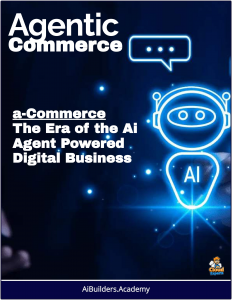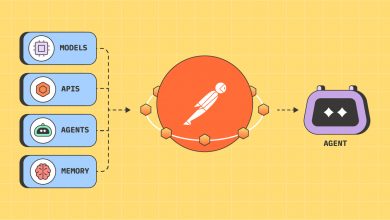 ‘Agentic Commerce’ offers a transformative solution, harnessing AI-powered autonomous agents to act intelligently on behalf of businesses and customers alike.
‘Agentic Commerce’ offers a transformative solution, harnessing AI-powered autonomous agents to act intelligently on behalf of businesses and customers alike.
These systems go beyond traditional rule-based automation, proactively making decisions in real time to optimize everything from product recommendations to supply chain logistics.
Unlike traditional automation, which follows predefined rules, agentic systems leverage machine learning (ML), generative AI, and real-time data to make decisions, adapt to changing conditions, and interact with customers in a human-like way. Agentic Commerce can manage inventory, personalize shopping experiences, streamline logistics, and even resolve customer queries—all with minimal human intervention.
The demand for such solutions is clear. Consumers expect hyper-personalized experiences, instant responses, and frictionless transactions, whether shopping online or in-store. Retailers, meanwhile, face pressures to optimize operations, reduce costs, and stay competitive in a crowded market.
Google Cloud’s AI and ML tools, combined with its scalable infrastructure, provide the foundation for building these next-generation commerce solutions.
Google Cloud AI
With Google Cloud’s robust infrastructure, advanced AI capabilities, and unparalleled data analytics, businesses can build agentic commerce solutions that are not only scalable but also deeply intelligent and customer-centric.
Imagine a virtual assistant that analyzes a customer’s browsing behavior, predicts their preferences, negotiates discounts within set parameters, and coordinates delivery—all in milliseconds. Or picture a supply chain agent that adjusts inventory in real time based on demand signals and weather forecasts.
These agents are context-aware, adaptive, and capable of learning from data, making them powerful tools for enhancing efficiency and customer satisfaction. Google Cloud’s comprehensive suite of tools makes it an ideal platform for building such systems. Its strengths in AI, machine learning, data processing, and scalable infrastructure provide the foundation for creating solutions that can transform the commerce experience.
Google Cloud’s AI and machine learning capabilities, particularly through Vertex AI, enable developers to craft custom models tailored to commerce needs. Whether it’s natural language processing for understanding customer intent, computer vision for analyzing product images, or recommendation systems for personalized offers, Vertex AI delivers the flexibility to create agents that drive conversions.
For instance, a retailer could use Vertex AI’s recommendation engine to power an agent that suggests products with uncanny precision, boosting average order values. Meanwhile, BigQuery, Google Cloud’s serverless data warehouse, processes massive datasets in real time, empowering agents to make data-driven decisions.
A pricing agent, for example, could leverage BigQuery to analyze competitor prices and customer demand, dynamically adjusting prices to maximize revenue. This combination of AI and real-time analytics ensures that agentic systems are both intelligent and responsive.
Dialogflow
Dialogflow, Google Cloud’s conversational AI platform, powers the creation of intelligent, natural language-based agents that enable seamless human-computer interactions. In the context of agentic commerce, Dialogflow is a cornerstone for building customer-facing agents that enhance user experiences, streamline operations, and drive engagement across industries.
Dialogflow enables businesses to create conversational agents—chatbots, voice assistants, or virtual customer service reps—that understand and respond to user queries in natural language.
Powered by Google’s advanced natural language processing (NLP) and machine learning, Dialogflow interprets user intent, manages context, and delivers dynamic responses. In agentic commerce, these agents act autonomously to handle tasks like answering customer inquiries, processing orders, or providing personalized recommendations, all while integrating with backend systems like Google Cloud’s BigQuery or Vertex AI for data-driven decision-making.
In customer support, Dialogflow-powered chatbots handle up to 80% of routine inquiries, such as order status checks, return requests, or FAQs, freeing human agents for complex tasks. For example, a fashion retailer might deploy a Dialogflow agent that assists customers with sizing questions, suggests complementary products, and processes returns via a website chatbot or voice-enabled device.
These agents use intent detection to understand queries like “Where’s my order?” and pull real-time data from APIs or BigQuery to provide accurate responses.
Personalized shopping experiences are another key application. Dialogflow integrates with recommendation systems (e.g., Vertex AI) to create agents that engage customers in natural conversations, suggesting products based on preferences, purchase history, or browsing behavior.
ADK
The Google Agent Development Kit (ADK), unveiled at Google Cloud Next 2025, is a transformative open-source framework designed to streamline the creation of AI agents and multi-agent systems, with a particular emphasis on integrating seamlessly with Google’s ecosystem, including Gemini models and Vertex AI.
Its features, such as real-time streaming for audio and video interactions, robust evaluation tools for debugging, and flexible deployment options via Vertex AI Agent Engine or Google Cloud Run, make ADK a powerful tool for building sophisticated e-commerce solutions that enhance customer experiences and optimize operations.
In the realm of e-commerce, ADK shines by enabling the development of autonomous agents that handle critical tasks like personalized product recommendations, dynamic pricing, inventory management, and customer support. These agents act intelligently on behalf of businesses and customers, leveraging real-time data and context-aware decision-making to deliver seamless, personalized experiences.
Vector Search
Complementing ADK, Google Cloud’s Vector Search, available through Vertex AI or AlloyDB with ScaNN, enhances e-commerce agents by enabling semantic and multimodal search capabilities.
Vector Search transforms product data—descriptions, images, and metadata—into embeddings, numerical representations that capture meaning, allowing agents to retrieve relevant items even when customer queries use varied or imprecise language.
For example, a query like “shoes for rugged trails” can match products described as “trail running sneakers,” thanks to semantic understanding. By integrating Vector Search with ADK, businesses can create agents that deliver highly relevant product recommendations, blending text and image-based searches to match customer preferences with precision.
Conclusion
The future of retail is agentic, and Google Cloud is the catalyst for this transformation. By combining AI, data analytics, and scalable infrastructure, businesses can create systems that anticipate customer needs, streamline operations, and drive growth.
As consumer expectations evolve, those who adopt agentic commerce will gain a competitive edge, delivering experiences that are seamless, intuitive, and delightful. The time to act is now. With Google Cloud as your partner, you can build a commerce ecosystem that’s smarter, faster, and ready for the future. Let’s shape the next era of retail together.



